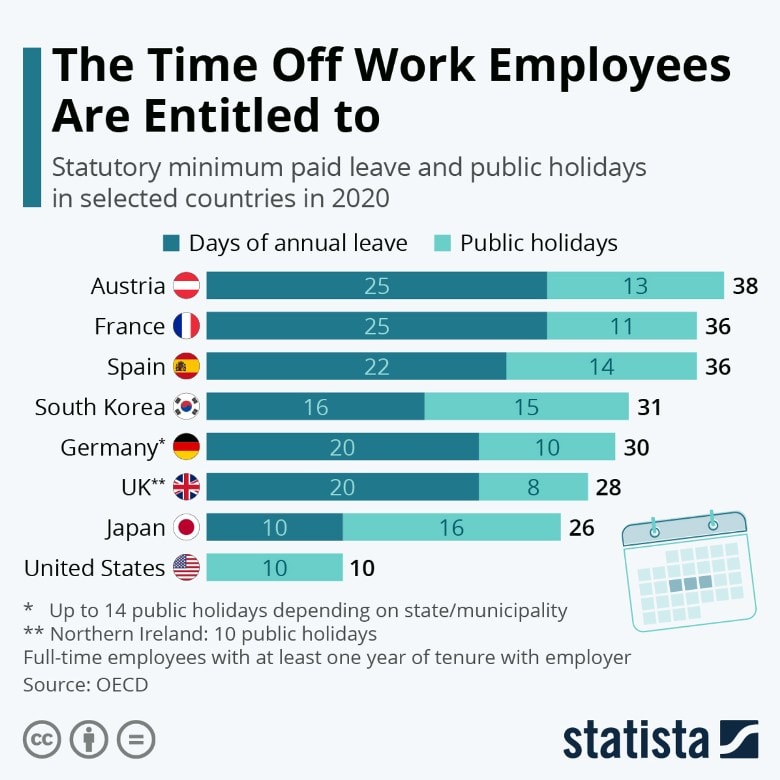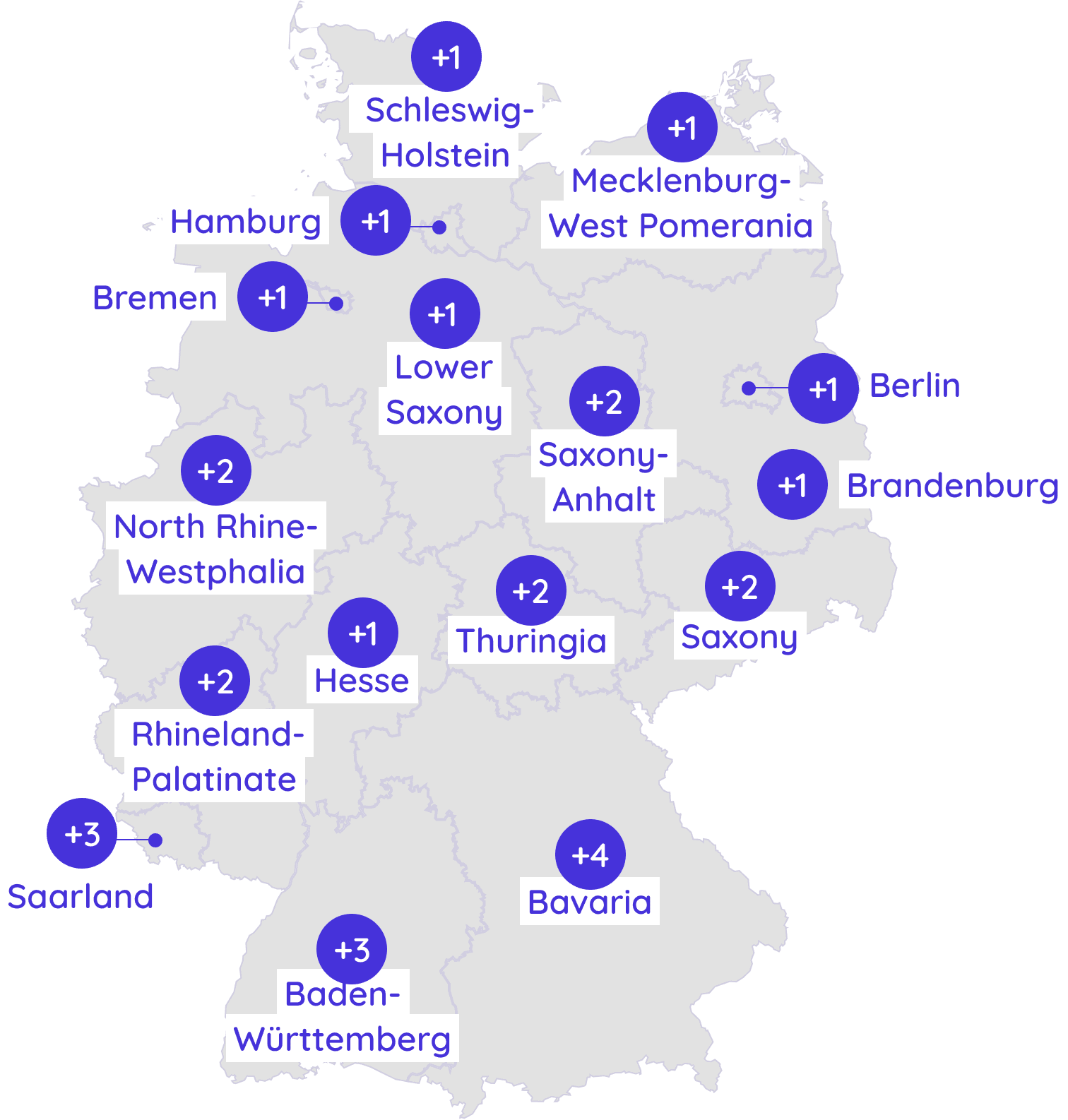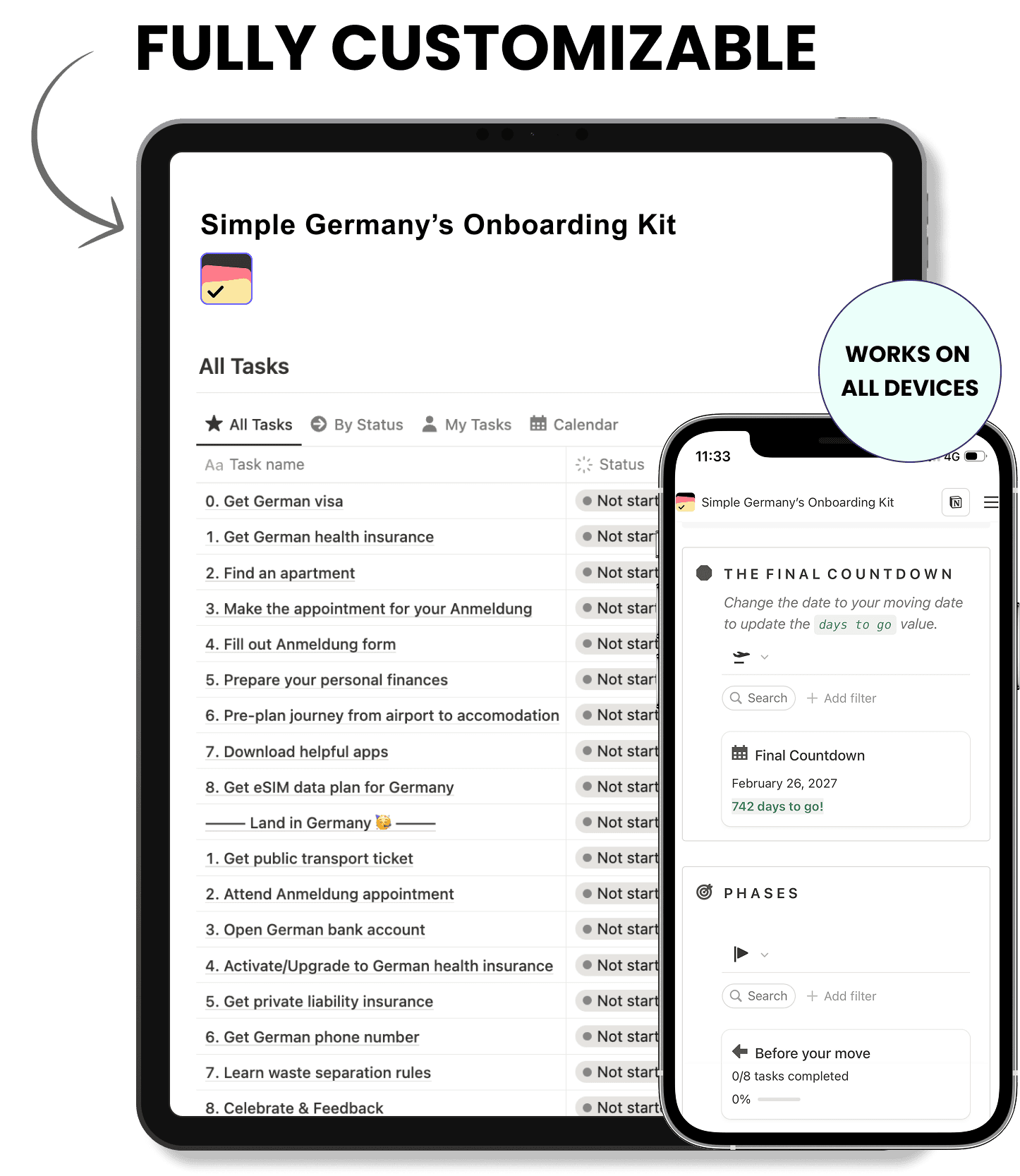The high number of paid vacation days in Germany is often one of the top benefits envied by employees worldwide. However, how many vacation days in Germany are you actually entitled to? In this guide, we will lay out all the details and even let you in on the secret of how to double or even triple your vacation days to up to 73 paid vacation days! 😱
Does Germany have paid vacation?
Yes, Germany ranks among the top 5 countries worldwide for the most paid vacation days (Urlaubstage) per year. During your paid time off, you continue to receive your regular salary.

Employers do not have to grant specific vacation pay or holiday bonuses; however, some companies include a special holiday payment (Urlaubsgeld) once a year with a fixed or percental amount.
🛫 Moving to Germany soon? Stay organized with our Onboarding Kit — a prebuilt task manager and your step-by-step guide to ensure you don’t miss a thing during your move!
- Get a Prebuilt Task Manager for Your Move to Germany: Know what your next step should be.
- Save Time & Stay Organized: Don’t spend hours Googling → Get all the essential resources, critical steps, and links to governmental sites in one place.
- Fully Customizable: Adjust, add, or personalize the template to match your unique situation.
How many vacation days are you entitled to in Germany?
The minimum statutory vacation days an employee is entitled to in Germany are 20 days per year for a regular 5-day work week. Respectively 24 days of paid holiday for a 6-day work week. Your entitlement for paid vacation is called Urlaubsanspruch in German.
However, most employers grant up to 30 days of annual paid leave. The average across Germany is 28 days per year. The number of Urlaubstage is listed in your employment contract or collective agreement (Tarifvertrag), depending on the industry you work in.
Additionally, you need to take or be allowed to take at least one vacation of a minimum of 2 weeks per year to allow proper rest and recovery from work.
Some companies track and compensate if you do overtime (Überstunden). Depending on what your employment contract states, you can either get paid for your overtime or use it for extra time off.
How much vacation do you have with a mini job or part-time work?
The amount of vacation days you are entitled to as a mini-jobber or part-time employee depends on the number of days you work per week and not on the number of hours. Let’s look at it in detail below.
Vacation Entitlements with a Mini-Job in Germany
A mini-job in Germany is an employed job where you do not earn more than 556 euros per month. To calculate your vacation entitlements as a mini-jobber, you need to consider the number of days you work per week, regardless of how many hours you work per day.
Let’s say you work 5 days a week for 1,5 hours each. In this case, you are entitled to 20 paid vacation days. Should you, however, only work 2 days a week for 3,75 hours each, you are only entitled to 8 vacation days.
The official website for mini-jobs offers a quick calculator to determine how many vacation days you deserve depending on the number of days you work.
Vacation Entitlements with A Part-Time Job in Germany
Like the mini-job, your vacation entitlements depend on the number of days you regularly work per week as a part-time employee.
If you receive the statutory minimum of vacation days, you can calculate the number of working days per week times 4.
| Workdays per week | Statutory vacation days |
|---|---|
| 1 workday | 4 vacation days |
| 2 workday | 8 vacation days |
| 3 workday | 12 vacation days |
| 4 workday | 16 vacation days |
| 5 workday | 20 vacation days |
If employees in your company receive more than the statutory vacation days, you are also entitled to the same amount. You can use the following formula to calculate your actual leave entitlement:

Example: You work 3 days a week in a company. The company grants 30 days of paid vacation to its employees who regularly work 5 days per week.

In this case, you would have the right to 18 paid vacation days.
You can find a calculator at the end of this article to enter your criteria.
How do you apply for holiday leave in Germany?
You should submit your vacation request at least 14 days before the desired days off by law. However, things often look very different in reality and vary from company to company.
In our experience, most companies use a software to track, submit and confirm or deny vacation requests. Some managers prefer to discuss your vacation plans beforehand; others just want you to use the software. The company culture dictates how flexible vacation planning gets handled.
We have worked in companies that asked employees to enter most of their vacation days into the yearly calendar during January or February to better plan team staffing. At the same time, we have also been able to take one day off spontaneously, when only enquiring a day beforehand.
A good rule of thumb is that you should plan and submit longer vacations that last 1-3 weeks months in advance, whereas you can request 1 or 2 days off spontaneously every once in a while.
After entering your desired vacation days in the software, your manager needs to confirm them. Only when confirmed are you allowed to stay away from work. Usually, your manager has up to 10 days to approve; otherwise, you can treat the vacation request as denied and enquire with your manager directly.
Depending on the staffing needs of your team, it is helpful that you discuss your vacation desires with your teammates. For example, in some teams, it is always necessary to have a minimum number of colleagues working, whereas in others it is ok if everyone is off simultaneously.
If you work in a team with parents of kids who go to school, you should remember that they are tied to taking vacation during school holidays. So, if you don’t have children, as a friendly colleague, you can try not to enter holiday requests during those weeks. Anyways, booking travels during school holidays is always more expensive and crowded.
The school holidays vary between German states. On this website, you find the school holiday schedule per state for 2025.
Unlike in some other countries and working cultures, as an employee in Germany, you are expected to take all your vacation days. Should you not do so proactively, you can expect your boss to ask you to enter your remaining vacation days until a certain deadline.
Can you carry over the remaining vacation days to the following year?
Technically, you need to take all your vacation days during the current calendar year. However, the law allows you to carry remaining vacation days to the following year for a maximum of 3 months until the end of March when certain exceptions are met.
In theory, according to §7 No. 3 of the Federal Vacation Act, this is only allowed if ‘urgent operational reasons or reasons relating to the employee’s person exist’. For example, this could be seasonal events, a large order, or staffing difficulties due to sick leave or parental leave.
Read Our Related Guide
In practice, we have never experienced a denial to carry the remaining vacation days to the next year. However, your employer might limit the number of vacation days you can carry over to, e.g., 10 days.
If you don’t take them until the end of March, you lose those remaining vacation days.
The not-used or remaining holidays at the end of a calendar year get called Resturlaub in German.
What applies to vacation when changing jobs?
If you want to change your job, your vacation entitlement depends on when you resign or get made redundant.
If you resign before June 30th of a calendar year: You have the right to a proportionate part of your vacation days, meaning 1/12th for each completed month. If this is not possible, the remaining vacation days need to be paid out.
If you resign after July 1st of a calendar year: You are entitled to all of your vacation days if you have worked in the company longer than 6 months. Your new employer will require a document stating the number of vacation days used by you in your previous company to grant you the correct number of holidays for the remaining year.
❗️Important note
Quite often, your employer bases your right to your vacation entitlement on the statutory minimum in case of a resignation and not on the total amount listed in your employment contract. So if you get 28 days a year and work 5 days a week, you may lose 8 vacation days, as by law, the minimum entitlement is 20 days.
Read Our Related Guide
What if you get sick while on vacation?
If you get sick during holiday leave, the days you are officially sick as per a doctor’s note will be credited to your remaining vacation entitlement. By law in Germany, vacation needs to allow rest and recovery from work. If you are sick, you can’t do so.
However, as an employee, you need to fulfill the following requirements:
- you need to visit a doctor’s office on the first day of your sickness.
- you need to present a doctor’s note for sick leave (Krankschreibung or Arbeitsunfähigkeitsbescheinigung) to your employer on the first day of your sickness and not only after you are back from vacation.
You are not allowed to independently prolong your approved holiday leave by the number of sick days you suffered. Instead, those need to be planned as a new vacation with your manager.
There are two exceptions to this rule:
- If you use your overtime to be on vacation, your employer officially does not consider this Urlaub, but Freizeitausgleich (compensatory time off). If you get sick during compensatory time off, you can’t reclaim these days due to sickness.
- Should your child fall sick during vacation, you can not claim your vacation days back.
Read Our Related Guide
What Is The Vacation Entitlement In The Event Of A Long-term Illness?
If you fall sick for months or years, your vacation entitlement does not expire directly. According to a verdict by the Federal Labor Court, employees are entitled to use their remaining vacation days up to 15 months after the end of a calendar year.
Does pregnancy affect your vacation entitlement in Germany?
No, pregnancy has no impact on your vacation entitlement. On the contrary, maternity leave in Germany is one of the strongest and most protective in the world.
As an employee on maternity leave, you keep the same amount of statutory vacation days, and you do not need to take holidays while on maternity leave.
Read Our Related Guide
Bonus: how to combine public holidays in Germany with vacation days to double your time off?
Germans love to maximize their holidays. And the best way to do so is by combining regular vacation days with public holidays. Since many German public holidays are during the week, you can often just use 1 vacation day to get 4 consecutive days off.
For example, if Thursday is a public holiday, you can take Friday off and have a 4-day long weekend. In this case, the Friday gets called Brückentag in German. The best translation would be ‘bridging day’, as you are building a bridge from Thursday to the weekend.
German Public Holidays System
The number of public holidays you benefit from in Germany depends on where you live or, more importantly, where you are employed.
Public holidays are managed by the 16 different German states and range from 10 to 14 days, out of which 9 are the same nationwide. Generally, the southern states in Germany have more public holidays than the northern states, which is tied to a stronger catholic community in the south.
Below is a map indicating the additional public holidays each state offers on top of the 9 nationwide public holidays.

Possible German ‘Bridging Days’ in 2024
We have created this dropdown menu to select the German state you are employed in. Find out which public holidays in 2024 fall on a weekday for you and how you can maximize your paid time off with Brückentage.
| Public Holiday | Day of the Week | Date | Dates you would be off | Vacation days used | Total days off |
|---|---|---|---|---|---|
| Good Friday (Karfreitag) / Easter Monday (Ostermontag) | Friday / Monday | 18 Apr / 21 Apr | 18 Apr - 4 May | 8 | 17 |
| International Workers' Day (Tag der Arbeit) | Thursday | 1 May | 1 May - 4 May | 1 | 4 |
| Ascension of Jesus (Christi Himmelfahrt) | Thursday | 29 May | 24 May - 1 Jun | 4 | 9 |
| Whit Monday (Pfingstmontag) | Monday | 9 Jun | 7 Jun - 15 Jun | 4 | 9 |
| German Unity Day (Tag der Deutschen Einheit) | Friday | 3 Oct | 27 Sep - 5 Oct | 4 | 9 |
| 1st and 2nd Day of Christmas (Weihnachtsfeiertage) | Thursday / Friday | 25 Dec / 26 Dec | 20 Dec - 4 Jan 2026 | 7 | 16 |
| TOTAL | 28 | 64 |
2 This is only a public holiday in approximately 1.700 out of 2.050 Bavarian municipalities with a predominantly Catholic population.
Here are three examples for your understanding:
- An employee in Berlin could use 25 vacation days to get a total of 60 days paid off (with a minimum of 4 days consecutively) when using every single Brückentag option.
- An employee in Düsseldorf could use 26 vacation days to get a total of 64 days paid off (with a minimum of 4 days consecutively) when using every single Brückentag option.
- An employee in Munich could use 30 vacation days to get a total of 73 days paid off (with a minimum of 4 days consecutively) when using every single Brückentag option.
Depending on the industry you work in, and whether your team always needs to be staffed, your employer may not allow you to take advantage of every single Brückentag option. For example, in my team, we used to divide the possible Brückentage between the team members.
Conclusion
Taking vacations as an employee in Germany is a must. So embrace your newfound freedom and plan your vacation days ahead of time as Germans do. We hope that the concept of using Brückentage to maximize your days off is enticing for you and shows you the abundance of travel opportunities.
Happy vacation planning! 🏝






